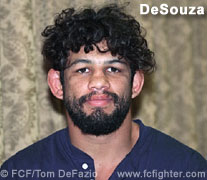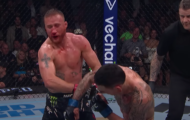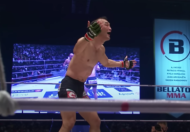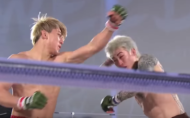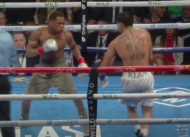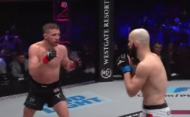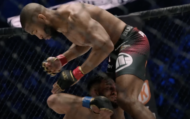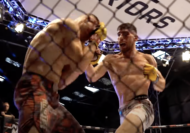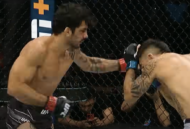Fabio Gurgel
Interview by Eduardo Alonso
Photos Marcelo Alonso
Originally printed in the June 2001 issue of FCF
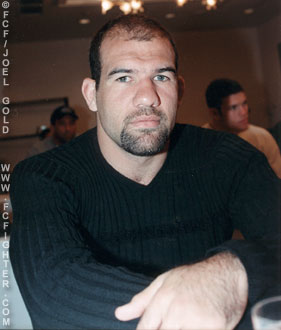
A black belt since 1989, Fabio Gurgel knows the real meaning of jiu-jitsu. Always respectful and humble, Gurgel has devoted his whole life to the "Arte Suave" [soft/gentle art — how jiu-jitsu is known in Brazil], and spreads the philosophy and techniques he has learned since he was 13 years of age to the four corners of world, doing seminars and running his jiu-jitsu association, the Alliance.
Learning from the likes of Jacaré Cavalcante and Rickson Gracie, it is no wonder that he is not only a great fighter, as well as a great teacher. With hundreds of students in his academy in Sao Paulo, and many more around the globe, Fabio loves to teach and share his experiences with younger fighters. Not many black belts can say that they witnessed and competed against so many generations as Gurgel has, and very few fighters in the world can say that they’re 3-time BJJ World champion…something Fabio Gurgel can proudly state.
One would think that this is enough to qualify Fabio as one of the greats in jiu-jitsu’s history, sure it is, but that’s not all. He also fought some epic Vale Tudo battles, in the best Brazilian style, fighting his heart and soul in true wars against the likes of Mark Kerr, who he fought for 30 minutes back in the days that elbows and head butts were still allowed. During his 12-year career as a black belt, Fabio did everything that he could to help his beloved art of jiu-jitsu, but there are always new projects coming, and sometimes it takes a lot more courage to make crucial decisions, than to keep on fighting. In this surprisingly conversation, Gurgel talked to FCF about a number of subjects, being as honest as he always was during all those years, and revealing some plans for the future that I’m sure will surprise a lot of people. Check out this great conversation with 3-time World Champion Fabio Gurgel!
Full Contact Fighter: Fábio, it’s a pleasure to interview you.
Fabio Gurgel: It’s my pleasure.
FCF: You started in jiu-jitsu at a pretty young age. How did you become interested in martial arts?
FG: I lived in Rio De Janeiro at the time, and jiu-jitsu already had a certain name due the Gracie family, but it was very small compared to what it is today in Brazil. In fact I started going to karate, because of the films I saw on TV and such, and karate was big at the time. I started karate training looking for a form of self-defense, to know how to fight. I trained karate for some months, but I didn’t adapt. At the same time my sister was dating a youngster who practiced jiu-jitsu, Heleno de Freitas, who was one of the top guys at the Carlinhos’ academy at the time. He became a great friend of mine and he took me to train jiu-jitsu. I started there when I was 13 years old, and by the time I was 15, I already knew it was going to be my profession.
FCF: Do you still have memories from the early days of training? How was it to start in jiu-jitsu in a much more romantic time and with so many great fighters training together? Didn’t you begin training under Jacaré Cavalcante?
FG: In fact my first master was not Jacaré. At the time that I started to train jiu-jitsu, I trained in a very small academy, at "Posto 6" in Copacabana, with professor Toninho. He was an older guy, and it was really the extreme of the romantic way of practicing jiu-jitsu. We did self-defense in the beginning of the classes, and also I really had very good basics during the 6 months that I trained with him. His academy closed, and he went to teach in another place; he moved far away from where I lived. Then, on the recommendation of Heleno, I went to train with Jacaré. When I arrived at Jacaré’s, I found out that Toninho by coincidence had also been Jacaré’s first professor, many years ago, at Carlson’s academy, when Jacaré first started to train. Later, Jacaré went to train with Rolls [Gracie], but his beginning was at Carlson’s academy. It was when I switched to Jacaré’s that I really started to take jiu-jitsu more seriously, to get involved in competitions, and to really know the people who made jiu-jitsu of that time. Jacaré was my master all of my life, it was him that promoted me through all of the belts, and he is still my master. I think that later since we created Alliance, he continues to be the master of everybody. And I really miss that time a lot, I miss the romantic side of training, because even though a rivalry between all the academies existed, it was a much more healthy rivalry. The commercial part of it did not even exist, it was a really romantic thing. And 90% of the people who practiced jiu-jitsu back then, they went on to have their own businesses and jobs…everybody became great friends. I find that my generation was the first that really had a condition of "living" jiu-jitsu; at that time there were few academies. I really miss those days a lot.
FCF: Do you believe that nowadays some academies are not respecting the traditional way of teaching jiu-jitsu, or is it just that the natural evolution of the sport has changed the way of training?
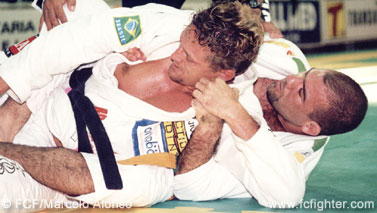
FG: I think that both things are true. I believe that a natural change exists, an evolution of the sport. In the old days when I started in jiu-jitsu, the classes were around 2 or 3 times per week. Nobody trained all day. I started to train all day when I started to compete, and only a few people did this. I believe that the evolution of the sport exists, nowadays if you do not train specifically for the rules of the competition, you won’t win. On the other hand, I find that an academy that teaches jiu-jitsu cannot run away from the philosophy of the art. You cannot teach only the competition side of jiu-jitsu, you have to try to balance things. In my academy for example, I have separate classes, for white belts and for the more advanced students, so that in the white belt classes, since they do not have to concern themselves with competing at the moment, I can give them a strong foundation in the basics, teach some self-defense, and make sure that they have a common knowledge of what jiu-jitsu is. Later, time becomes very short, and it is hard to reconcile the competition side of jiu-jitsu with the romanticism of the old days. [It’s difficult] to have time to teach self-defense and have another sort of relationship with the student, that’s really important. I find that the academy that has success today is that one that balances the two things.
FCF: You fought in some closed-door matches, and challenges at the academy in your teenage years. Were there a lot of rivalries between jiu-jitsu and other martial arts back in those days?
FG: In fact, what happened in the old days was that jiu-jitsu did not have the exposure that it has today, so the people had curiosity. People talked about jiu-jitsu and such, but it was common to see people come to the academy without any notion, and wanting to train. Then people of karate, Tae kwon do, boxing, etc., always came to the academy. In fact they weren’t real fights, it wasn’t NHB…they were tests to make people start to believe more in jiu-jitsu. Jacaré would say: "You fight Tae kwon do, so you can kick and punch and stuff, do what you want, but all he has to do is grab you and take you down, and dominate you." People did not know anything of jiu-jitsu; back then, it was really jiu-jitsu against the other martial art, to prove the supremacy of jiu-jitsu in relation to the other martial arts, without the intention of hurting anybody. We obviously had to defend and protect ourselves, so that generated some obvious adrenaline, as if it was a real fight. What was cool was that it was everything done for the name of jiu-jitsu was a certainly romantic thing, striviing for the growth of the art.
Click here to continue with the interview
|

